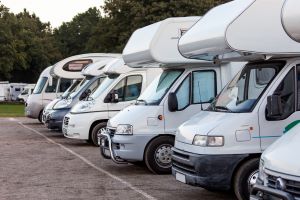MONDAY, JUNE 12, 2023
Whether you’re a seasoned traveler or just beginning your journey into the recreational vehicle (RV) lifestyle, protecting your investment and ensuring peace of mind on your travels is paramount. RV insurance is designed specifically to safeguard your beloved home-on-wheels with coverage tailored to the unique needs of RVs. Accidents can happen when we least expect them and being prepared with the right insurance policy can make all the difference. 
Does RV Insurance Cover Personal Belongings Inside the RV?
RV insurance may offer personal property coverage for personal belongings inside an RV. While coverage specifics can vary depending on the insurance policy, many RV insurance plans offer protection for personal property such as clothing, electronics, kitchenware and other valuable items you typically carry on your travels. It’s important to review the terms and conditions of your RV insurance policy to understand the coverage limits and any exclusions that may apply.
What Does RV Insurance Typically Cover in Terms of Damage and Liability?
Your RV insurance policy may provide coverage for physical damage to the RV and liability protection. The following are some typical coverage options that may be available:
- Collision coverage may help pay for repairs or replacement if your RV is damaged in a collision with another vehicle or object, regardless of who is at fault.
- Comprehensive coverage may help protect against damage to your RV from noncollision incidents such as theft, vandalism, fire, falling objects or natural disasters.
- Liability coverage may protect you financially if you are found legally responsible for causing bodily injury or property damage to others.
- Uninsured/underinsured motorist coverage may help pay your medical bills and damages if you’re involved in an accident with a driver without insurance or insufficient coverage.
- Medical payments coverage may help pay for medical expenses for you and your passengers if injured in an RV accident, regardless of fault.
- Personal property coverage may cover personal belongings inside your RV if damaged during an accident.
- Emergency travel expenses coverage may help cover costs associated with emergency accommodations, transportation and other necessary expenses if your RV becomes uninhabitable due to a covered loss while you’re away from home.
What Is the Difference Between Liability, Comprehensive and Collision Insurance for RVs?
Liability insurance protects you from legal and financial liabilities for injuries or property damage caused to others. Comprehensive insurance may cover damages to your RV from noncollision incidents, such as theft or fire. Collision insurance may cover damages resulting from collisions with other vehicles or objects. Insurance providers will most likely recommend all three coverages to RV owners.
Contact Gerhart, Hartman & Ritner to discuss RV insurance options. We can help ensure you have the coverage you need for your specific RV.
No Comments
Post a Comment |
|
Required
|
|
Required (Not Displayed)
|
|
Required
|
All comments are moderated and stripped of HTML.
|
|
|
|
|
|
NOTICE: This blog and website are made available by the publisher for educational and informational purposes only.
It is not be used as a substitute for competent insurance, legal, or tax advice from a licensed professional
in your state. By using this blog site you understand that there is no broker client relationship between
you and the blog and website publisher.
|